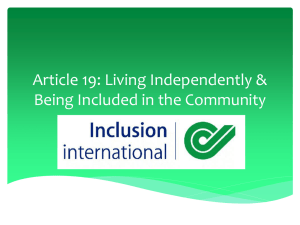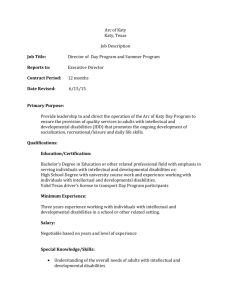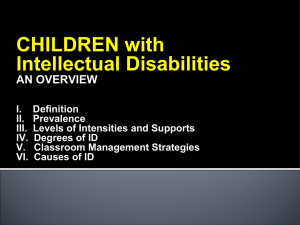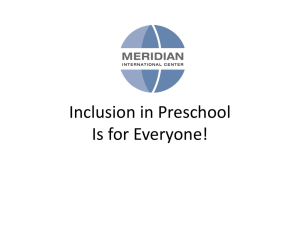Leadership training for self-advocates and family
advertisement
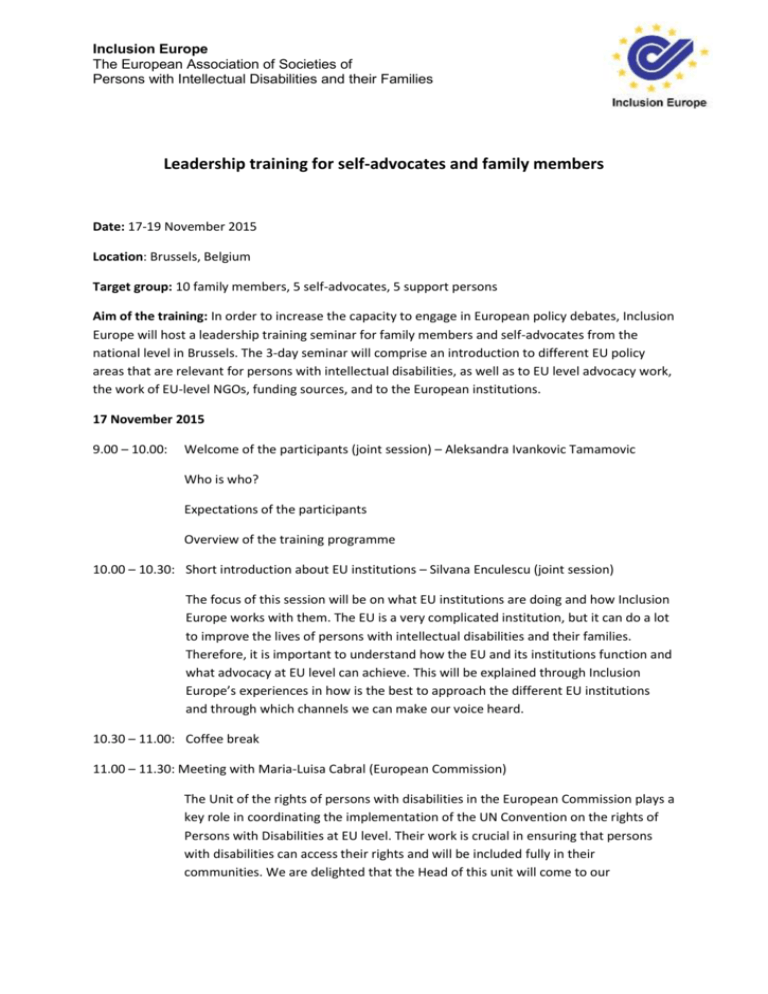
Inclusion Europe The European Association of Societies of Persons with Intellectual Disabilities and their Families Leadership training for self-advocates and family members Date: 17-19 November 2015 Location: Brussels, Belgium Target group: 10 family members, 5 self-advocates, 5 support persons Aim of the training: In order to increase the capacity to engage in European policy debates, Inclusion Europe will host a leadership training seminar for family members and self-advocates from the national level in Brussels. The 3-day seminar will comprise an introduction to different EU policy areas that are relevant for persons with intellectual disabilities, as well as to EU level advocacy work, the work of EU-level NGOs, funding sources, and to the European institutions. 17 November 2015 9.00 – 10.00: Welcome of the participants (joint session) – Aleksandra Ivankovic Tamamovic Who is who? Expectations of the participants Overview of the training programme 10.00 – 10.30: Short introduction about EU institutions – Silvana Enculescu (joint session) The focus of this session will be on what EU institutions are doing and how Inclusion Europe works with them. The EU is a very complicated institution, but it can do a lot to improve the lives of persons with intellectual disabilities and their families. Therefore, it is important to understand how the EU and its institutions function and what advocacy at EU level can achieve. This will be explained through Inclusion Europe’s experiences in how is the best to approach the different EU institutions and through which channels we can make our voice heard. 10.30 – 11.00: Coffee break 11.00 – 11.30: Meeting with Maria-Luisa Cabral (European Commission) The Unit of the rights of persons with disabilities in the European Commission plays a key role in coordinating the implementation of the UN Convention on the rights of Persons with Disabilities at EU level. Their work is crucial in ensuring that persons with disabilities can access their rights and will be included fully in their communities. We are delighted that the Head of this unit will come to our Inclusion Europe The European Association of Societies of Persons with Intellectual Disabilities and their Families Leadership training to answer your questions about EU policies and the actions the EU takes to support persons with intellectual disabilities. 11.30 – 13.00: Session A (family members): Why is Europe relevant for families of people with intellectual disabilities? – Geert Freyhoff This session will discuss what the European level has to do with intellectual disability, and why it is important to advocate for the rights of persons with intellectual disabilities at EU level. Sometimes it is difficult to see all the areas that where EU decisions make a direct impact in your own country, but indeed the EU can do a lot to make the lives of persons with intellectual disabilities better. It is useful to know what topics the EU is currently working on that could bring change for many people and how is the best to get involved in these debates. Session B (self-advocates): Why is it important to make your voice heard at EU level? – Magdi Birtha Introducing what the EU can do for persons with intellectual disabilities and why is it important that self-advocates are active at that level. The interactive session will build on issues that participants are interested, or have barriers in their home countries and will show that the EU can do something to improve their lives. 13.00 – 14.00: Lunch 14.00 – 15.30: Session A (family members): How to work effectively at EU level: The example of the Employment Framework Directive– Geert Freyhoff The aim of the session is to highlight how effective advocacy work at EU level can pervade national level and make a real change in people’s lives. This will be shown through the example of the EU Employment Directive and its impact on the employment opportunities of people with intellectual disabilities. Persons with intellectual disabilities are often excluded from the labour market, and parents who are staying at home as carers of their children with complex needs, face additional barriers. The EU is committed to combat discrimination in employment, therefore persons with intellectual disabilities and their family members should have access to decent jobs and wages. Is this not the case in your country? We will tell you what can be done to improve the situation! Session B (self-advocates): How can you make your voice heard at EU level: The European Platform of Self-advocates – Magdi Birtha, Senada Halilcevic This session will introduce the European Platform of Self-advocates and through examples tell the participants what EPSA did to raise the awareness of EU decisionmakers about important issues. This year, EPSA participated in a training that NGOs gave to staff of the European Commission about independent living. The EU decides about the spending of a lot of money, but unfortunately some of this money is spent Inclusion Europe The European Association of Societies of Persons with Intellectual Disabilities and their Families to maintain big institutions. These are not places where people with disabilities want to live, so it is important to explain to the decision-makers how this money should be spent. Self-advocates are the best to advise the European Commission about the way they want to live. 15.30 – 17.00: Let’s get out of the EU bubble! - Sightseeing in Brussels 18.00 – Dinner 18 November 2015 9.00 – 9.30: Summary of Day 1 – Aleksandra Ivankovic Tamamovic 9.30 – 10.30: The right to vote: Making our voice heard in EU politics (joint session) Aleksandra Ivankovic Tamamovic This session will focus on the right to vote and the situation of persons under guardianship who are not being able to participate in the elections at the national and EU level. Why is it important to vote? How can it be that many people still cannot vote? How could we change the situation? Why the EU level can be a good place to raise this issue? 10.30 – 11.00: Coffee break 11.00 – 12.30: ‘Together we are stronger’: Roundtable with allies of Inclusion Europe on how to best advocate together (joint session) – Catherine Naughton (EDF), Luk Zelderloo (EASPD), Frank Sioen (ENIL); potentially: EUD, MHE, IF. 12.30 – 13.30: Lunch 13.30 – 15.00: Session A (family members): Top tips on EU funding opportunities – EC (Annelisa Cotone tbc) This session aims to help participants to get informed about the available EU funding that can support advocacy work in their home country. A representative from the Unit of the Rights of Persons with Disabilities will provide useful insights on what is necessary for a successful application. Session B (self-advocates): How to prepare for a meeting with an MEP? – Silvana Enculescu Top tips from Inclusion Europe on how can you be successful when you prepare for a meeting with a politician or a decision-maker. Role play on the preparation, how to understand the topic of the meeting, what needs to be done before an event, how we dress, and how we act etc. Inclusion Europe The European Association of Societies of Persons with Intellectual Disabilities and their Families 15.00 – 15.45: Evaluation of the training 16.00 – 18.00: Visiting the Parlamentarium 19 November 2015 10.00 – 14.00: Participation in the seminar of Inclusion Europe and the NewPaths to Inclusion project network in the European Parliament: ‘Putting citizens at the centre of politics’ - Using person-centred planning in the transition from institutional to community-based living (Lunch provided there 13.30 – 14.00) 14.30 – 15.30: Visiting the European Parliament with a guide 15.30: Farewell& goodbyes -------Requests for participation should be sent as soon as possible, but at the latest by 16 October 2015 to m.birtha@inclusion-europe.org. Please note that places will be assigned on the first come, first served base. Inclusion Europe can pay costs for a limited number of self-advocates and/or their support persons. Some additional funding may be available for family members upon request.

